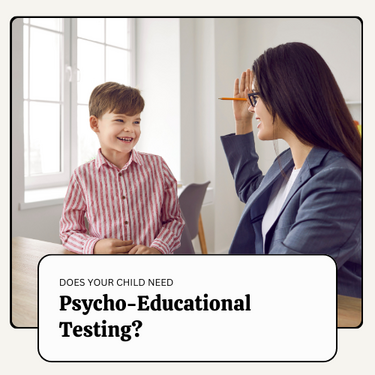
What is Psycho-Educational Testing?
Psycho-Educational Testing is sometimes called psych-ed evaluation. This form of evaluation is designed to empower caretakers and key care providers with the information required to promote the child’s greatest potential for developmental success. It is common for a Psycho-Educational Evaluation to include the child, the child’s caretakers, the child’s teachers, and when appropriate, the child’s key primary healthcare providers.
Psycho-Educational Testing evaluates the unique way a child learns by assessing the child’s strengths and weaknesses in five core areas:
Benefits of Psycho-Educational Testing
There are many benefits of Psycho-Educational Testing, however the primary purpose of Psycho-Educational Testing is to identify where exactly a child needs specific supportive care, especially in learning environments, and to align the child’s collective support system on how the child’s potential and needs are best nurtured. Remember: the goal of Psycho-Educational Testing is to enhance the possibility for a child’s ultimate potential to be realized.
Other benefits of Psycho-Educational Testing include:
Psycho-Educational Testing vs Psychological Evaluations
Psycho-Educational Testing seeks information from a learning and educational perspective, whereas a Psychological Evaluation is a bit more medical and examines overall psychological, emotional, behavioral, and relational functioning.
Learn more about Psychological Evaluation Testing.
Psycho-Educational Testing vs Scholastic Assessments
Scholastic Assessments deal specifically with an academic subject that involves verbal and quantitative reasoning skills. Psycho-Educational Testing is often more comprehensive than a school administered scholastic assessment, which typically only is undergone in the event of clear academic concerns based on the school’s perception, not the parents. Additionally, Scholastic Assessments typically lack a psychological examination and do not evaluation emotional, relational, or behavioral challenges.
Does my child need Psycho-Educational Testing?
Psycho-Educational Evaluations are ideally suited for children who either demonstrate potential gifted psycho-educational levels of understanding or children who are having trouble in school or demonstrating developmental struggles. However, the information collected from a psychoeducational evaluation is highly informative and helpful for every student and child, regardless of circumstances.
If you have reason to believe that school accommodations would benefit your child, if you suspect your child may have a learning disorder or disability, or if your child demonstrate obvious intelligence yet struggles to achieve standardized forms of academic success, then a psycho-educational test may be extremely helpful. The detailed insight the test will reveal about the unique way a child is wired is very empowering and helpful for both the child and their entire support system.
Who provides Psycho-educational Testing?
Psycho-Educational Tests are typically administered by a registered or licensed school psychologist who has graduate-level educational training in developmental, educational, or school psychology. The examiner may be recommended by the school or healthcare provider or in some cases, may be provided through an inhouse psychologist at participating private and public schools.
How much does Psycho-Educational Testing cost?
The cost for psycho-educational testing varies greatly, but most evaluations costs around $2,000 to $5,000. The actual examination typically takes about a week, but it is not uncommon for the process to last several weeks or months depending on the tests and desired observations needed. If the point of the evaluation is to diagnose a psychological disorder such as anxiety, depression, or ADHD, then health insurance may cover part of the cost, however if the concern is primarily educational or learning related, then coverage is unlikely.
Find a Psycho-Educational Testing Clinician
Visit www.KidsTherapyFinder.com and search our directory to find a clinician today.

Sign up for our newsletter to get instant access to parenting resources sent directly in your inbox!
